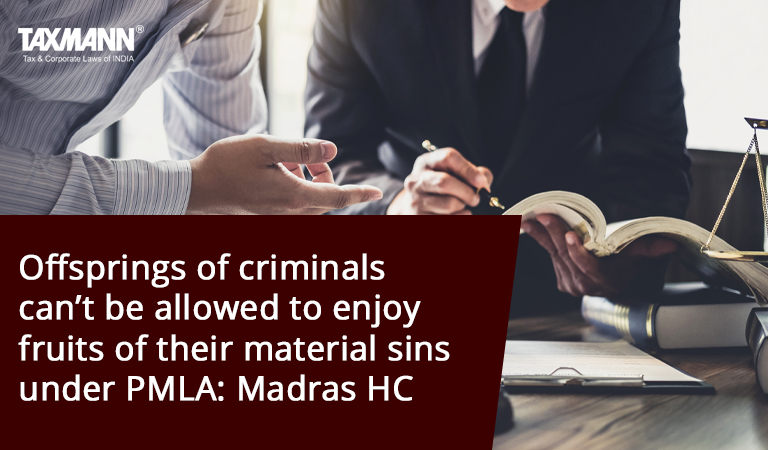Offsprings of criminals cannot be allowed to enjoy fruits of their material sins under PMLA: Madras HC
- Blog|News|FEMA & Banking|
- 2 Min Read
- By Taxmann
- |
- Last Updated on 15 December, 2025

Case details: Dhanalakshmi Sridhar v. Deputy Director, Directorate of Enforcement, Chennai - [2021] 128 taxmann.com 69 (Madras)
Judiciary and Counsel Details
-
- P.N. Prakash and V.Sivagnanam , JJ.
- R. Rajarathinam for the Petitioner.
- Ms. G. Hema , Central Government Standing Counsel for the Respondent.
Facts of the Case
People indulge in criminal activities for various reasons, one of which, is to amass wealth for themselves and their descendants, and the Prevention of Money Laundering Act (PML Act) seeks to send a stern warning to criminals that it would neither allow them nor their offspring to enjoy fruits of their material sins and that State would not only appropriate ill-gotten wealth but would also punish those who are found in possession and enjoyment of such tainted
In the instant case, Police forwarded a letter to Enforcement Directorate stating that ‘S’ who was a criminal had been evading judicial proceedings in India for a period of three years and had purchased several properties in India in his name, in name of his wife and his daughter ‘D’ (petitioner) out of criminal activities, in support of which, cases pending against him were furnished.
As a result, the Enforcement Directorate registered a case and took up an investigation of the case under the PML Act. The Enforcement Directorate filed a complaint against ‘S’ and 6 others, including his daughter ‘D’, seeking quashing of which, ‘D’ had preferred instant criminal petition invoking section 482 Criminal Procedure Code (Cr.P.C.)
High Court Held
However, the investigation conducted by Enforcement Directorate showed that ‘S’ never had any legitimate income and that his daughter ‘D’ had not even filed income tax returns, whereas, she owned properties worth around Rs. 19 crores. Since there were prima facie materials for trial to proceed against the petitioner, impugned proceedings could not be quashed in exercise of powers under section 482 Cr.P.C.
Cases Referred To
- State of Maharashtra v. Dnyaneshwar Lakshman Rao Wankhede [2010] 2 SCC (Crl.) 385 (para 6)
- Dr. Partap Singh v Director of Enforcement, Foreign Exchange Regulation Act [1985] 22 Taxman 30/155 ITR 166 (SC) (para 6).
Disclaimer: The content/information published on the website is only for general information of the user and shall not be construed as legal advice. While the Taxmann has exercised reasonable efforts to ensure the veracity of information/content published, Taxmann shall be under no liability in any manner whatsoever for incorrect information, if any.

Taxmann Publications has a dedicated in-house Research & Editorial Team. This team consists of a team of Chartered Accountants, Company Secretaries, and Lawyers. This team works under the guidance and supervision of editor-in-chief Mr Rakesh Bhargava.
The Research and Editorial Team is responsible for developing reliable and accurate content for the readers. The team follows the six-sigma approach to achieve the benchmark of zero error in its publications and research platforms. The team ensures that the following publication guidelines are thoroughly followed while developing the content:
- The statutory material is obtained only from the authorized and reliable sources
- All the latest developments in the judicial and legislative fields are covered
- Prepare the analytical write-ups on current, controversial, and important issues to help the readers to understand the concept and its implications
- Every content published by Taxmann is complete, accurate and lucid
- All evidence-based statements are supported with proper reference to Section, Circular No., Notification No. or citations
- The golden rules of grammar, style and consistency are thoroughly followed
- Font and size that’s easy to read and remain consistent across all imprint and digital publications are applied



 CA | CS | CMA
CA | CS | CMA
